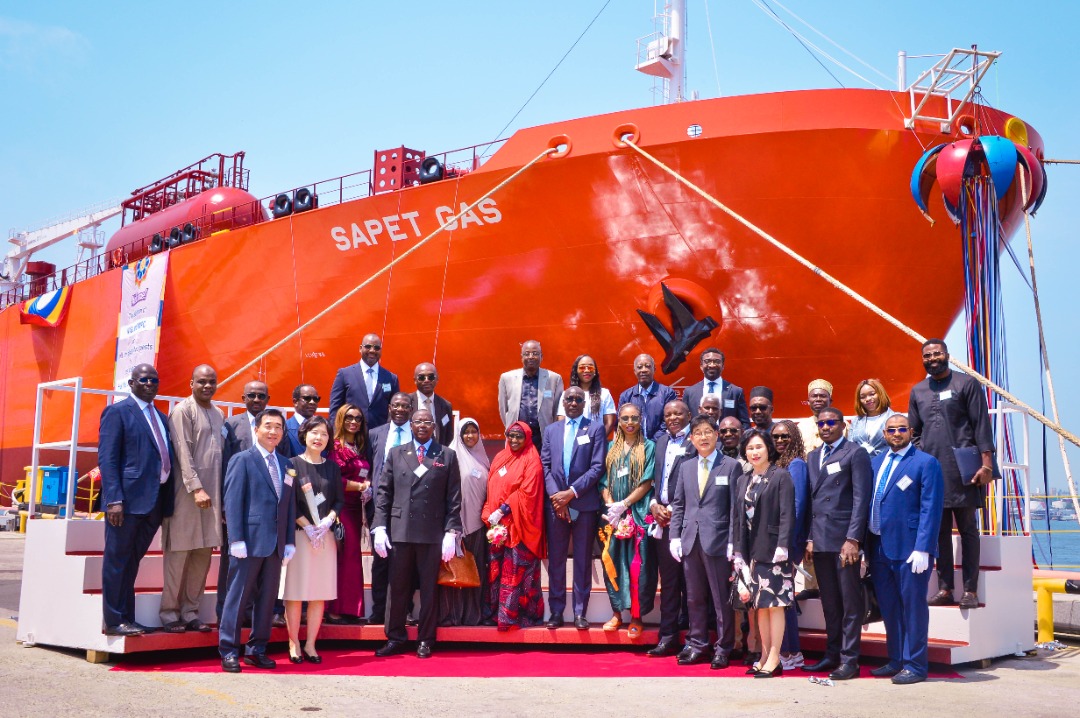SAPET GAS, the first Liquefied Petroleum Gas (LPG) vessel to be named in Ivorian and fly the national flag, made its historic maiden voyage to Cote D’Ivoire.
The 23,000 cubic meter capacity vessel, which cost CFA 26 billion, was received by Excellence Mamadou Sangafowa Coulibaly, Minister of Energy, Vamissa Bamba, Director General, Petroci, Temitope Shonubi, Executive Director, Sahara Group, Wale Ajibade, Executive Director, Sahara Group, Soro Tiotioho, Director General, Societe, Ivoirienne de Raffinage (SIR), Kam S and others
SAPET GAS, as a clean fuel, will improve butane supply, availability, efficiency, and distribution in Cote D’Ivoire, spurring economic development and ensuring the well-being of over 28 million Ivorians. It will also help over 50 million people in neighboring countries gain access to the commodity.
Energy Minister Sangafowa Coulibaly stated that the government had subsidized butane gas across the country in order to increase accessibility, reduce, and eventually eliminate household use of firewood. “This policy has made it possible to significantly increase national consumption of butane gas, which has thus increased from 150,000 MT in 2012 to 510,000 MT in 2021, representing a 14 percent annual growth rate.” “I applaud the PETROCI/SAHARA collaboration, particularly the Sahara Group, for investing in the acquisition of this vessel dedicated solely to the importation of butane gas into our country,” he said.
According to Temitope Shonubi, Executive Director of Sahara Group, facilitating investment in gas infrastructure and supply strengthens the company’s commitment to driving Africa’s energy transition. “We are honored and delighted to collaborate with the government and people of Cote D’Ivoire to make clean energy available to all Ivorians.” SAPET GAS is an affirmation of Sahara’s commitment to Cote D’Ivoire. “We made a promise, and we kept it,” he said.
Bamba, the Petroci DG, praised Sahara Group for its diligent and harmonious collaboration with all stakeholders since the energy conglomerate began operations in Cote D’Ivoire. He stated that the SAPET ENERGY partnership began on October 7, 2020, with the laying of the first stone for the construction of three butane spheres with a total capacity of 12,000 Tons to improve the butanisation policy.
“This storage infrastructure will increase existing storage capacities and allow us to self-consume for 15 to 30 days.” SAPET GAS will ensure the supply of butane gas to our country under safe and high-quality conditions,” he added.
Dr. Sylvestre EMMOU, Mayor of the Municipality of Port-Bout, stated that the Port will play its strategic role in ensuring that the maritime industry contributes its quota to promoting access to energy solutions in Cote D’Ivoire.
“This storage infrastructure will increase existing storage capacities and allow us to self-consume for 15 to 30 days.” SAPET GAS will ensure the supply of butane gas to our country under safe and high-quality conditions,” he added.
The joint venture between Sahara and Petroci, dubbed SAPET GAS, will play a key role in ensuring that Cote D’Ivoire receives approximately 1,000,000 tonnes of LPG over the next three years. This will be positioned next to other vessels owned by the Sahara Group, an energy and infrastructure conglomerate, including the Africa Gas, Sahara Gas, and Barumk.
With over CFA 279 billion invested since 2014, Sahara Group’s partnership with Petroci has expanded access to gas as a cleaner fuel option. The 12KT LPG storage facility project is still on schedule for SAPET. When the facility is finished, it will, among other places, support the supply, distribution, and accessibility of cleaner fuels in Guinea, Mali, Burkina Faso, and Cote D’Ivoire.
Global investments in gas vessels are increasing, and over the next two years, 28 new medium and handy gas carriers are anticipated, with 18% of them going to Sub-Saharan Africa.
The following factors are driving the growth of the LPG market: low capital consumption with room for expansion; population growth and urbanization; potential to replace kerosene/biomass in the domestic sector; and potential shift to cleaner fuels.








